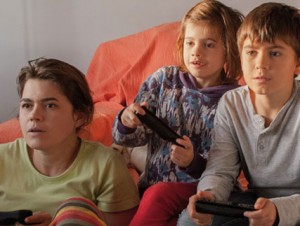
** The results of this survey are now available in the Digital Games and Family Life infographic series **
Back in 2012, the Joan Ganz Cooney Center embarked on a multi-stakeholder game design project, also known as “Hard Fun: Learning Mathematics,” funded by the NSF with lead designers at E-Line Media and premier researchers in neuroscience from University of Rochester and Johns Hopkins University. The goal was to design and research an educational game that both parents and kids would find just as interesting and fun to play as commercial entertainment games like Call of Duty or Mario Kart. To best inform design and marketing decisions, the Center conducted two rounds of focus groups with parents and kids ages 7-11. We designed the questions to help gauge parent beliefs and attitudes about video games and how they shape decisions around purchases and mediation of kids video game play. We also wanted to know what filter parents approach these decisions with and where they draw the line between what’s appropriate and inappropriate.
Some key things we discovered included:
- Parents in the sessions grew up playing video games, and the majority of them still continue to play them today. Some even lamented about today’s games not being as challenging as the games they grew up with, such as The Legend of Zelda.
- The parents who grew up playing video games expressed their enjoyment of playing games as a whole family or watching each other play.
- Parents of younger children (ages 7-9) were generally more concerned about violence than the parents of older children since the 10- to 11-year-olds are already exposed to mature games, often beyond parental control.
- Parents in the session came to realize that many of the games they consider age-appropriate do contain violence in the tradition of the Road Runner and Wiley Coyote cartoons, but it’s the realistic stuff that parents most object to.
Given that these findings were from a small set of parents and children, we wanted to dig deeper using multiple research methods to further explore this issue with a wider U.S. population. The Joan Ganz Cooney Center has developed a survey, known as The Digital Games and Family Life Survey, that will further inform design and marketing decisions for the “Hard Fun” project as well as others who want to design learning games. This is an exciting and important time to conduct such a survey given that more affordable and portable gaming platforms are popping up left and right and thus, have led to video games showing up in other life settings. Both schools and the workplace have realized the motivational power of video games, and in recent years started to seek out strategies to deepen learning and improve productivity. For this survey of parents of 4-13-year-olds, our research team sets out to get a sense of the role that digital games are playing in modern family life and routines, across both place and time.
This survey ties back to the focus groups by recognizing that parents today grew up playing video games themselves and that their histories and relationships with video games essentially impact their parenting practices around video games. This focus is unlike past surveys that have typically focused on adults separately from children, or asked parents about their children’s gameplay rather than their own. The survey also serves to help us understand parents’ attitudes and practices around video game play and how it varies across demographics such as children’s ages, family structure, location, etc.
With this post, we officially launch the survey! The Cooney Center, in partnership with the Center for Games and Impact at Arizona State University, invites parents of children ages 4 through 13 to take the Digital Games and Family Life Survey. We will keep the survey open for about a month and will release findings in Spring 2014. By taking this survey or disseminating it to your networks, you will be helping designers, developers, and researchers create the best games for families to enjoy, while also moving this exciting research and design project forward!
** Edited: 2/28/2013: This survey is now closed. **


